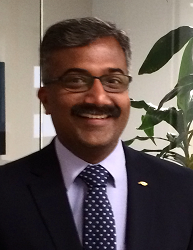Isotc292online.org: You are a member of India’s mirror committee to TC 292. Can you briefly introduce your NSB and mirror committee, please?
HoD: The National Standards Body of India was established under the BIS Act 1986 and is known as the Bureau of Indian Standards (BIS).
For the creation of Indian Standards, BIS functions through the Technical Committee structure comprising of Sectional Committees, Subcommittees and Panels set up for dealing with specific topics. The committee structure of BIS seeks to bring together all those with substantial interest in a particular project, so that standards are developed keeping in view national interests and after taking into account all significant points of view through a process of consultation. Decisions in BIS technical committees are reached through consensus. As a policy, the standards formulation activity of BIS has been harmonized as far as possible with the relevant guidelines as laid down by ISO.
The mirror committee to ISO/TC 292 in India is Sectional Committee MSD 4. The committee looks forward to work with ISO/TC 292 and its secretariat, closely.
Isotc292online.org: Who are the key stakeholders of Security and resilience in India?
HoD: The Key stakeholders include, but are not limited to, all public sector and private sector organizations, civic bodies, consumers and Indian citizens at large. I understand, ISO recently communicated to BIS that according to the last ISO survey result, certification and interest on ISO 22301 has progressively grown in India in the last few years, from 480 certificates in 2014 to 1607 in 2016. This reflects an increasing stakeholder base in India, thus BIS decided to upgrade its membership to ISO/TC 292 from “O” to “P” this year in the interest of its stakeholders.
Isotc292online.org: ISO/TC 292 covers a broad spectrum of standards. In what areas are India’s main interests in the committee???
HoD: There is tremendously remarkable work acomplised in ISO/TC 292 and most of the work items are of interest to India. The main interest areas in the committee at this moment are Continuity and Resilience as well as Supply Chain related standards.
Isotc292online.org: How do you work currently in these areas (e.g.: are there any laws, regulations, national standards or other rules?) and how can ISO standards help?
HoD: I notice currently, it is more of voluntary adoption of best practice by organizations while in few sectors e.g. in banking, business continuity is mandated by the regulator Reserve Bank of India(RBI) by issuing notification to this effect. I understand, the National Disaster Management Authority (NDMA) has prepared a national policy framework keeping in view the National Vision to build a safe and disaster-resilient India, too.
ISO standards can help the stakeholders understand the best practices in the relevant areas and give better assurance due to its internationally accepted nature.
Isotc292online.org: So far have you adopted any standards developed by ISO/TC 292 as a national standard in India?
HoD: No, at this moment no standard developed by ISO/TC 292 has been adopted as a national standard in India. However, ISO 22301 and ISO 22313 are two standards developed by ISO/TC 292 being considered for adoption by the Mirror Committee to ISO/TC 292 in India.
Isotc292online.org: ISO/TC 292 is now working on the revision of ISO 22301 Security and resilience – Business continuity management systems – Requirements. What is your interest in this project and how would you like to see it develop?
HoD: The standard has seen growing acceptance among stakeholders in India, therefore the revision will have a high impact on its users in India. It is indeed a great pleasure to work with experts from different nations participating in the working group revising ISO 22301. I would like to see it develop into a more user-friendly and relevant standard with a realistic and practical expectation that adds value to the user organization and community at large.
Isotc292online.org: How does your mirror committee involve itself in standard development at present and how do you see this developing in the future?
HoD: The mirror committee is at its early stage of existence. We are in the process of mobilizing it, building capabilities and giving it a clear direction looking at the interest of our stakeholders in India. The mirror committee is committed to function ensuring greater alignment with ISO practices. The committee plans to regularly participate in all ISO/TC 292 activities to its best of ability. With the remarkable support from our NSB BIS and their close working relationship with ISO, I am sure the mirror committee will be able to make a meaningful and impactful contribution to the standard’s development.
Isotc292online.org: What advice can you give to interested parties in India who want to offer their input to the work of ISO/TC 292 and your mirror committee and who should they address?
HoD: We are continuously looking for experts who can contribute to Sectional Committee MSD 4 and ISO/TC 292. Experts who want to voluntarily participate in the activities of MSD 4 and contribute, can contact Ms. Sneh lata, Sc. E & Head (MSD) at Telefax: 011 23231106 or E-mail: msd@bis.org.in.
Isotc292online.org: Are there any possible new projects to be expected from India?
HoD: The immediate and top priority is to build capability within the mirror committee by mobilizing and attracting more experts to contribute to the large spectrum of existing work in ISO/TC 292. This will then enable us to look at possible relevant new projects.
Interview conducted by Dr. Frank Herdmann, Germany, member of the TC 292 Communication Group